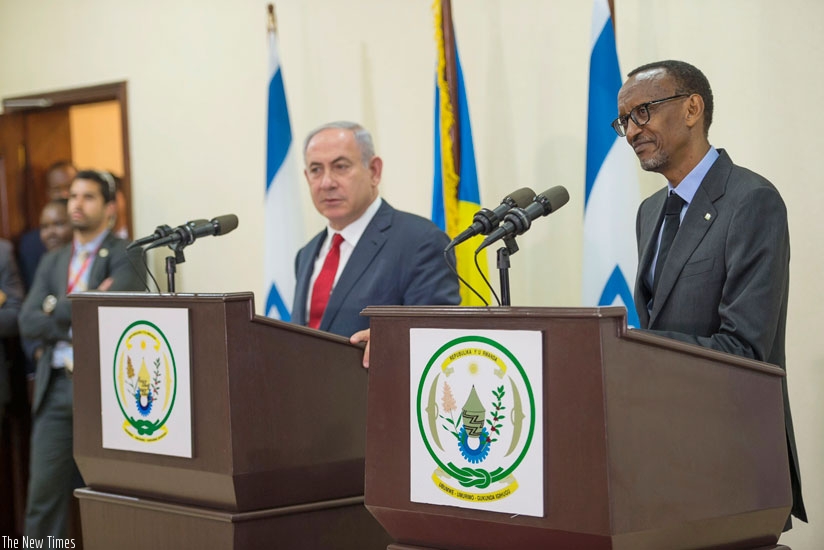President Paul Kagame and Israeli Prime Minister Benjamin Netanyahu highlighted the lessons learned from the countries’ common tragic history of the Genocide against the Tutsi and Holocaust denial.


President Paul Kagame and Israeli Prime Minister Benjamin Netanyahu highlighted the lessons learned from the countries’ common tragic history of the Genocide against the Tutsi and Holocaust denial.
The two made the remarks, yesterday, at a joint news conference at Village Urugwiro in Kigali during the state visit of the Israeli prime minister.
"Given our tragic histories, we have been shaped to see and do things in a way that gives priority to our people,” Kagame said.
Netanyahu added that one of the main lessons is the importance of nations defending themselves and not counting on external intervention.
"No one will defend you if you do not defend yourselves. They may not even defend you if you can defend yourself. In the end, what the two countries have learnt is that during the failure of the international community and the UN to intervene we have to have the capacity to defend ourselves. This is the most important lesson we take from the Genocide and the Holocaust,” he said.
Emphasising the importance of fighting denial, both Kagame and Netanyahu observed that trends of Genocide and Holocaust denial continue to exist despite overwhelming evidence to the contrary.
President Kagame said that countries have put in place measures to confront genocide denial such as educating deniers about the past.
"Genocide and Holocaust deniers continue to be there, we cannot wish them away. You have to put in place ways and means to make sure that you do not let it pass, you deal with it upfront,” he said.
Kagame explains denial
President Kagame said that among the reasons for denial is not lack of facts about the past but rather intent to be on the wrong side or the deniers involvement in perpetrating the Genocide or Holocaust.
"They don’t deny because they don’t know the facts and history. Some of the deniers are actually perpetrators in the first place,” he said.
Genocide and Holocaust denial continue to be a major issue with numerous attempts to distort history through written and audio-visual form even by internationally acclaimed media houses.
Over the last few years, perpetrators of the Genocide and their sympathisers have actively campaigned to deny the crimes they committed or the magnitude of the atrocities.
This has been through publications, books, movies, documentaries and social media platforms aimed at trivialising the 1994 Genocide against the Tutsi.
On his part, Netanyahu said that in the face of Genocide and Holocaust denial, truth has to be told to avoid distortion of history.
"Against Holocaust and Genocide denial, we have to tell the truth, it is an ongoing battle. This is not a theoretical exercise; it is an attempt to distort history saying that it did not exist,” Netanyahu said.
From a personal perspective, the Israeli premier said he had dedicated his life to seeing to it that such tragedies do not have a chance for re-occurrence.
editorial@newtimes.co.rw


